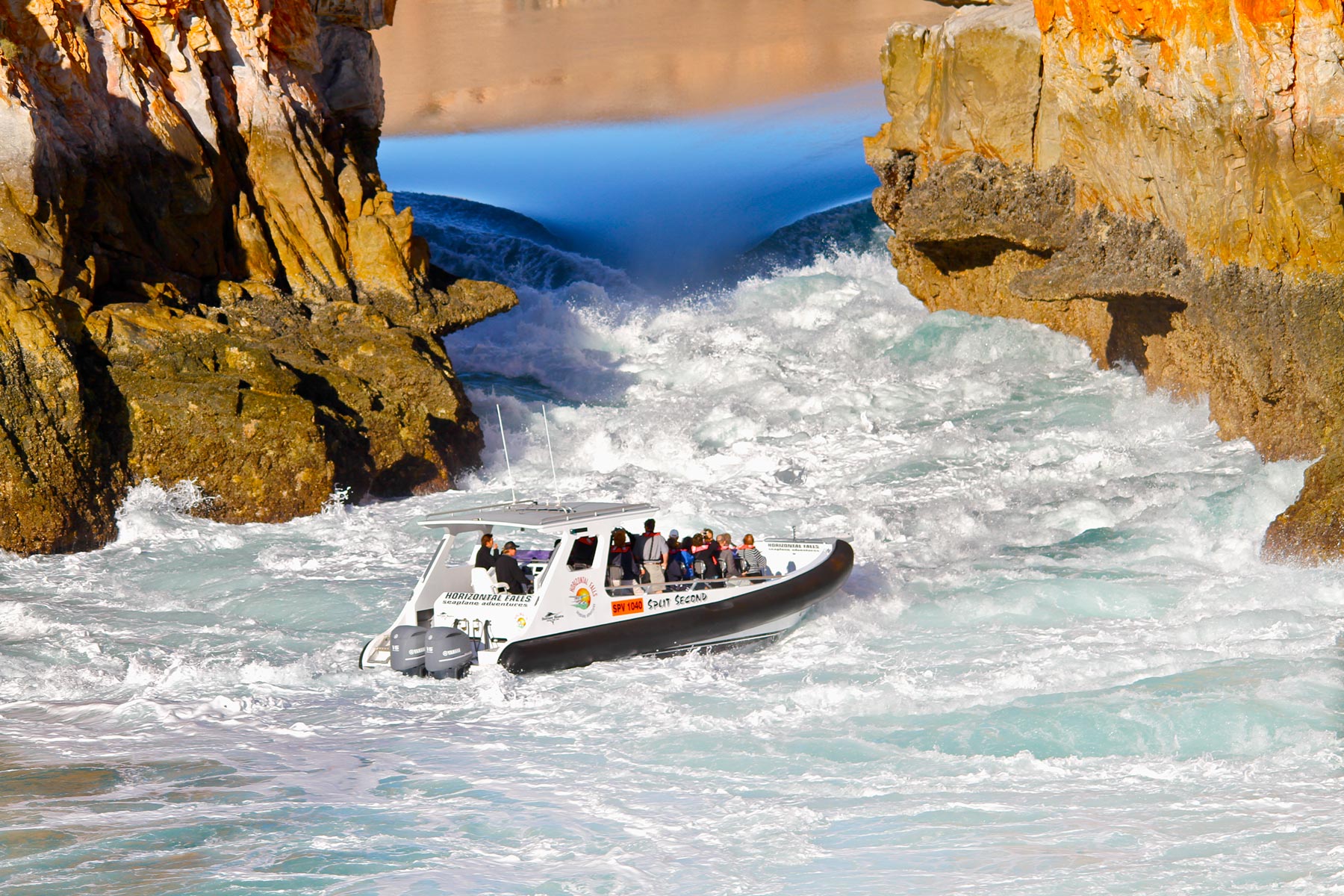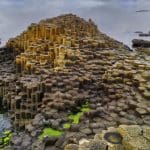The Horizontal Falls is one of Australia’s strangest natural sights. It’s a rare mix of rough coastal terrain and strong tides that draws large groups of people who are willing to pay a lot to see it up close. But soon things will be different.
Ocean waves crash between two small cracks in the cliffs, making a wave that looks like a waterfall and can reach up to four meters high. Talbot Bay is a remote spot on the northwest coast of the country. The Indigenous Traditional Owners of the area are upset about this because they say the land is holy. For decades, tourists in strong boats have been going through these holes.
There are other problems with the boat trips as well. In May 2022, one boat hit the rocks, hurting people and requiring a large-scale rescue operation. After the event, there were calls to stop the trips for safety reasons.
Even though the boat trips have kept going, Western Australia, the state where the falls are located, has reacted to the Indigenous Traditional Owners’ worries by saying that they will not be allowed in 2028 out of respect.
You can still see things up close. Not everyone likes the change. The WA Tourism Council, which represents the state’s tourism business, says it will make people less likely to visit and cause a lot of job losses.
The Inhabitants Have Remained Respectful At Horizontal Falls
The Dambeemangaddee people have lived in this area for 56,000 years and think that boats pollute the falls. However, they have accepted the boats anyway. Location: The Horizontal Falls are in the Kimberley Region, 1,900 kilometers (1,180 miles) north of Perth, the state capital. They are part of Maiyalam, one of three protected marine parks created in 2022 with the help of Traditional Owners and the Western Australian government.
In answer to complaints about how committed it is to protecting Indigenous sites in a state with a lot of mining, the Western Australian government took action. By the end of 2026, no other boat tour company in Talbot Bay will be running any more trips. The main company, Horizontal Falls Seaplane Adventures, will no longer fly over the falls after March 2028.
No matter what happens, boats will still be able to go through Talbot Bay. This will let people get a close look at what the British naturalist David Attenborough has called “Australia’s most unusual natural attraction.”WA Environment Minister Reece Whitby said in a statement, “This decision shows that the government has two duties: to respect the cultural views of Traditional Owners and to protect and support WA’s tourism industry.”

“We want people to experience Indigenous culture as an important and exciting part of visiting Western Australia’s jointly managed national and marine parks.” There were many Indigenous groups that lived in Western Australia (WA) for more than 50,000 years before the British came and violently took it over in the 1780s. The Dambeemangaddee was one of them. Then, a huge amount of land that Native Americans owned was taken or destroyed.
Honor The Power Of This Place
By banning Horizontal Falls, this place will be holy once more. The native people in the area think that boats going through these gaps bother Woongudd, the magical snake that made this amazing sight.
Woongudd’s story is in the Dreamtime, which is an old book of stories and rules that have shaped Aboriginal life in Australia. People say Woongudd moves the water over the falls by gliding between the rocks. Boat tours are hurting this “powerful, sacred place,” the Dambeemangaddee said in response to the ban. This is something that Traditional Owners have said since the 1990s.
“This journey has been hard on our emotions for many of us,” they said. “This choice makes us feel like we were finally heard.” They lived there for a whole year, and we can still feel their presence. It is a quiet place. But it could be dangerous. In their society, Traditional Owners would only go through the cracks in the rocks at the right time and for a certain reason.
The Dambeemangaddee made it clear that they want people to keep visiting the Horizontal Falls. There, people believe that visitors may be courteous and still be in awe of the tides. They advised tourists, “Respect the power of this place and our cultural obligations to care for the Country and keep you safe.” They were discussing their historical function as Australia’s natural protectors.
The Dambeemangaddee said that they had begun producing new films and pamphlets that would discuss their cultural and spiritual connections to Talbot Bay prior to the Horizontal Falls ban. In addition, they are creating fresh tours, welcoming activities, and a strategy for managing tourists in the region.
The prohibition, according to opponents, will lead fewer people to attend. Horizontal Falls Seaplane Adventures said in a statement that it will be transitioning to a “culturally appropriate program that will allow visitors to experience the spectacular natural wonder of the Horizontal Falls in a respectful context.”
What The Authorities Say On The Matter
Evan Hall, CEO of Tourism Council WA, expressed opposition to the autumn boat restriction. According to him, people have been doing this activity in the Kimberley for a very long time. He said that prohibiting it would harm fifteen tourism-related enterprises and eliminate around fifty-eight full-time employment in the region.
As stated in a statement earlier this month by Hall, the falls allow visitors to experience the unique and amazing quality of this unique location. “You can’t watch it from the sidelines and understand it.” Everyone has access to and ownership of the land and water found in national parks. According to the law, National Parks shall promote and facilitate public leisure and nature-based tourism. Restricting guest access is ineffective in achieving this aim.
Sally Shaw, CEO of Kimberley Day Cruise, supported the restriction, however. She informed CNN that the Horizontal Falls trips offered by her organization only travel near, not through, the cliff gaps. According to her, it is risky and disrespectful to the falls’ Traditional Owners to drill holes in them.
According to Shaw, “We don’t cross the falls for safety and cultural reasons, and our tour has never done this.” “Most of the people who go on these tours know about different cultures and know that the future is a safe national treasure that we can all enjoy.”






